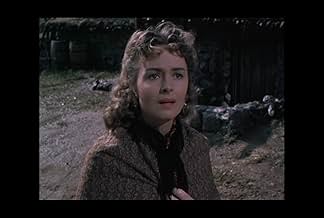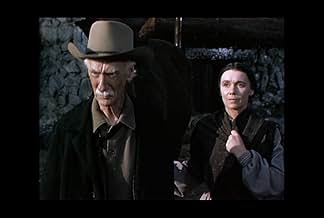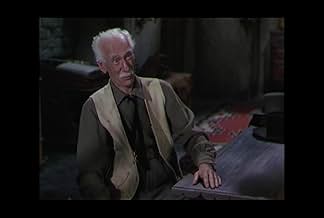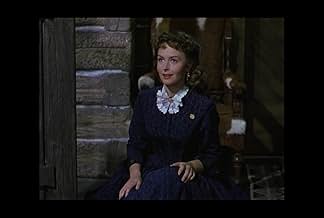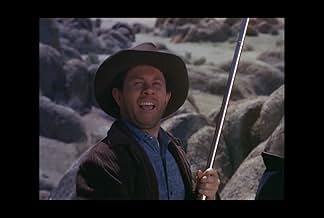Adicionar um enredo no seu idiomaA Confederate Major and his troops are falsely led to believe the Civil War is not over, and become wanted men after they attack a Union Army wagon train in Nevada.A Confederate Major and his troops are falsely led to believe the Civil War is not over, and become wanted men after they attack a Union Army wagon train in Nevada.A Confederate Major and his troops are falsely led to believe the Civil War is not over, and become wanted men after they attack a Union Army wagon train in Nevada.
- Union Captain
- (não creditado)
- Drifter
- (não creditado)
- Hank Fletcher
- (não creditado)
- Stage Driver
- (não creditado)
- Drifter
- (não creditado)
Avaliações em destaque
If you like western movies, you'll enjoy this one. Scott and Marvin are good with Marvin standing out in almost every scene he's in, especially with Donna Reed and I really liked Claude Jarman Jr.'s performance playing the young man who's reluctant to pull the trigger and all of his scenes interacting with Jeanette Nolan (Mrs. Margaret Harris) and Clem Bevans (The Station manager and Nolan's father) are great. Plot is one that I've never seen in a western genre film before, Confederate soldiers don't know that the war is over and are on a mission to steal gold from Union troops, the lone solder from the Union detachment tells the confederate soldiers that the war had been over for a month just before he dies placing the men in a bad predicament.
This isn't a bad western, but its not one that I would recommend to individuals unless they are fans of the genre because it follows the tried and true western plot from beginning to end. Action starting off the movie with lots of drama and a little action to drive the plot along until you come to the inevitable shootout and fight to bring the story to its conclusion. Saying that may make it sound like I don't like the movie which isn't true, I do like it, the acting is great and the plot and dialogue stands out, it just doesn't contain anything that would make it stand out in such a way where individuals who are not fans of the genre would find it appealing. If you want a movie that will entice you to start watching the genre, start with something like The Cowboys with with John Wayne or Quigley Down Under with Tom Selleck, both of which I think will keep anyone's attention, but if you have seen everything that Selleck and Elliot has offered in the 90s and you want to see how the OG boys from the 40s and 50s did it, then you can't go wrong watching this.
As Scott grew older in his acting career, he made predominately Westerns. At the same time his face grew harder, more sinewy and austere. Something of his matinee idol looks and southern accent remained, but age brought something else - a moral gravitas than added immeasurably to his on-screen presence. Finally the 'Scott character' achieved a magisterial quality - a characteristic that added immeasurably to the ironic resonance of his last film Ride The High Country.
In Hangman's Knot, Scott plays a Confederate officer who only learns that the Civil War is over after a successful action in which his group take a gold shipment from Union soldiers. He and his men agree to return home, each with their share of the booty, but run across some outlaws who corner them in a way station, laying siege to them.
This is a situation familiar to those who know those later Scott-Boetticher masterpieces, and the familiar hallmarks are already in evidence. Even the same locations are utilised. Like the later films with a different director, this is a morality play, almost a chamber drama, where Scott makes a dignified stand of principle. In Hangman's Knot, those with the dark hearts are both outside the way station's walls waiting to pounce, as well as inside (a characteristic performance by Lee Marvin, reminiscent of that he gives in The Big Heat). These are the men that Scott's character, Stewart, cannot relate to: those without honour or moral courage, greedy, cruel men. For Scott, as he says in one of those later films, 'there are some things a man can't ride around' and these are the choices that have to be made. A man needs to face up to his options in life and live with himself on or off the trail. When he tells Marvin here that he 'never really knew (him) at all', we know the moral battlelines have been drawn, just as distinctly those that existed between the warring states.
At first the gold is merely the spoils of war. Then it becomes a short cut to happiness, an unexpected reward for the men's trouble, and a compensation for the loss of the War. Finally it is just a moral encumbrance, both to body and mind. By the end of the film, as Scott and the boy let the heavy saddle bags slip off their shoulders, the sense of relief is tangible - one which isn't just physical.
A film well worth investigating, full of artistic resonance and anticipations. And if you haven't seen the later Scott-Boetticher vehicles, some of the greatest B-Westerns ever made, see this as a taster.
Incredible to think that this fine Western was the only effort to have been directed by Roy Huggins; because it's exactly that, damn fine. He would go on to direct notable work in TV such as The Virginian, The Rockford Files, Maverick and The Fugitive, but it seems that he wanted to put down a marker that he could in fact direct a feature length film, and although it only runs at a respectable 80 minutes, he must have been real satisfied with the finished product. Huggins is backed up by genre legend Randolph Scott in the lead role of Major Matt Stewart, with Scott providing the sort of performance that reminds us of his excellent work for Budd Boetticher in Ride Lonesome, The Tall T and Comanche Station etc. Donna Reed (lovely as ever), Lee Marvin (another fine loose cannon job), Richard Denning and Frank Faylen all beef up the cast, and although some of the other supporting players do not quite shine so bright, they do, however, earn their corn and don't harm the movie.
The film itself is structured real well, we open with a fantastic sequence as the "Rebs" attack the Union troop, with Charles Lawton Jr's photography expertly capturing the Lone Pine vista in Technicolor glory. From here we are centred inside the way station in what at first appears to be your standard Rio Bravo set up, this set up could easily have failed if the characters inside the building were dull and very uninteresting. Thankfully Huggins, who wrote the story as well as directing it, gives us characters of interest with little offshoots of conflicts to further enhance the plot. This makes for a tense build up until we lurch towards the inevitable showdown where the rouges gallery of thugs outside - who want the gold at any cost to life - plot with hungry menace.
It's not perfect by any stretch of the imagination, as some B movie traits and budgetary tone downs are evident, but the quality is still impressively high. From the direction and photography to the performances of the leads; Hangman's Knot is an essential viewing for the discerning Western fan. 8/10
The story written by Huggins concerns the final days of the tumultuous Civil War that not only split the nation asunder, but families and friends as well. Major Matt (Scott) is in command of a small band of rebel soldiers whose assignment is to hijack a union gold shipment in far off Nevada and take no prisoners. They succeed only to learn that Lee surrendered to Grant several weeks earlier. What to do? The major and his rebels decide to keep the gold and determine what to do with it later. The only rascal amongst the rebels is Ralph, an early role for Lee Marvin, who as usual steals the show. It seems his meanness has only grown as a result of all the violence he has experienced during the war. His killer proclivities have come to dominate his psyche. Though old pals in the saddle, Ralph and the Major are continually at each other's throats. Also a member of the rebels is a youngster who has not yet tasted blood, Jamie (Claude Jarman Jr. who first scored big as a twelve-year-old in "The Yearling").
As the rebels make their getaway, knowing that they will be hunted down as murderers and traitors by the Yankees, they are set upon by a gang of outlaws who claim to be seeking justice but who really want the gold. The rebels are chased to an outpost via stagecoach where they hold up in what turns out to be a standoff. The leader of the outlaw gang is Quincey, portrayed by veteran actor Ray Teal in one of his best roles. He was always a reliable actor who could be counted on to give a good performance. But this time he goes beyond the expected and turns in one of the best acting jobs ever. Today he is most famous for playing Sheriff Roy Coffee in the ever popular "Bonanza" TV series. Another surprise is to see Guinn 'Big Boy' Williams, who usually played good old boy types, half-comic, half tough guy, as one of the meanest hombres around, Smitty. He is more sadistic and cruel than Lee Marvin in this film, which is saying a lot. Sweet Donna Reed is, well, sweet, but handles the part of a nurse, Molly, engaged to a slime ball, Lee Kemper (Richard Denning of TV's Mr. North fame), beautifully. Jeanette Nolan and Clem Bevans are effective as daughter and father of a young man who died in battle after his father had been killed in the war. The lead role is filled admirably by Randolph Scott. He captures all the nuances and contradictions of Major Matt while remaining charming enough to capture the heart of Nurse Molly. The rest of the cast including the redoubtable Frank Faylen provides the necessary support for this excellent western.
The title "Hangman's Knot" is metaphoric. Literally, the knot is tied to hang Cass (Faylen), but the knot also stands for the symbolic noose around the neck of each character for various reasons explored by the interaction of a great cast.
Você sabia?
- CuriosidadesAfter the scene of Lee Marvin holding Donna Reed against the wall, she was so terrified by him that she did not let him come near her on and off the set.
- Erros de gravaçãoWhen the Confederates ambush the Union gold shipment, they use dynamite. The film is set in 1865, but dynamite was not patented by its inventor, Alfred Nobel, until 1867. Dynamite was not in use during the American Civil War by either side.
- Citações
Lee Kemper: You got 'em confused.
[Lee laughs]
Lee Kemper: They'll a-find out though and get their hands on it, there ain't gonna be nobody left alive in here to tell. You got any plans?
Major Matt Stewart: Mm-hmm. We go out shooting.
- ConexõesReferenced in Hollywood Remembers Lee Marvin (2000)
Principais escolhas
- How long is Hangman's Knot?Fornecido pela Alexa
Detalhes
- Data de lançamento
- País de origem
- Idioma
- Também conhecido como
- Hangman's Knot
- Locações de filme
- Empresas de produção
- Consulte mais créditos da empresa na IMDbPro
Bilheteria
- Faturamento bruto nos EUA e Canadá
- US$ 1.250.000
- Tempo de duração
- 1 h 21 min(81 min)
- Cor
- Proporção
- 1.37 : 1


